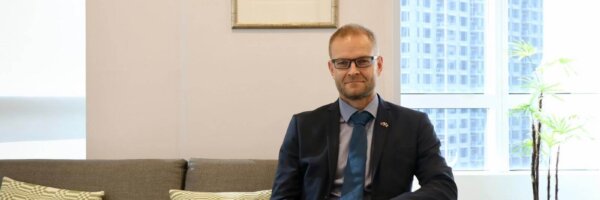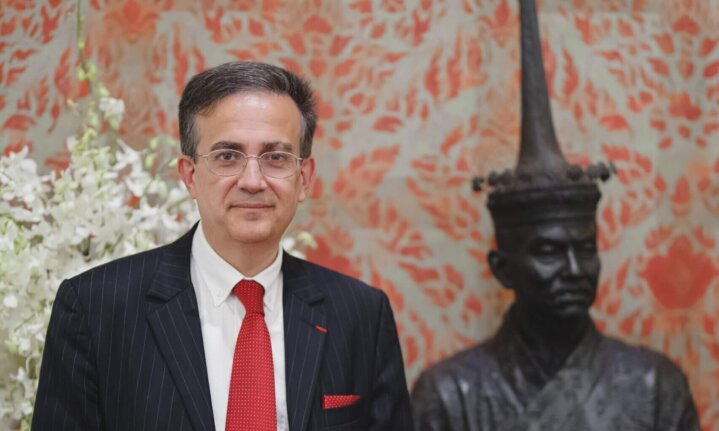
H.E. Mr. Thierry Mathou Ambassador for France to the Kingdom of Thailand
Expat Life recently interviewed the French Ambassador to Thailand and was pleased to update his previous interview with us.
How long have you been the Ambassador to Thailand?
I took office at the end of 2020 and I received my letters of credence from His Majesty the King in April 2021. But I have been coming to Thailand for many years before that both for professional and private trips.
My first visit to Thailand was in 1983 as a backpacker. And for the younger me, that first visit, as for everybody else, left a long lasting impression in my mind. Thailand does that to people, it leaves a mark on you.
Did you arrive to Thailand direct from home, and or where were you posted before?
Before being appointed to Thailand, I was Director General for Asia and the Pacific at the French Ministry of Foreign Affairs. Before that, I was posted in Asia for many years – about 15 years in China where I held several positions including Consul General in Shanghai, 5 years in Myanmar as Ambassador, 3 years as Ambassador in the Philippines where I was also accredited to the Republic of Marshall Islands, the Federated States of Micronesia, and the Republic of Palau.
As a matter of fact I have been living and working in Asia for most of my life. When I was DG for Asia and the Pacific I drew the blueprint of the French IndoPacific Strategy which was formally presented in 2018 by President Emmanuel Macron. I also initiated France’s candidacy to the development partnership with the ASEAN, which is an important component of our IndoPacific strategy.
I have always been convinced of the importance for France to have a comprehensive and active diplomacy in Asia. Alongside my diplomatic career, I am also a scholar of Himalayan Studies associated with the National Center of Scientific Research (CNRS) in Paris. Bhutan is my main academic focus. So even if Thailand is very different from other countries in Asia, it is not really a new way of life for my wife and I, who has been following me all over Asia during all these years. In my mind, in my heart, and in my vision of the world, I am almost Asian. Maybe I was in a previous life!
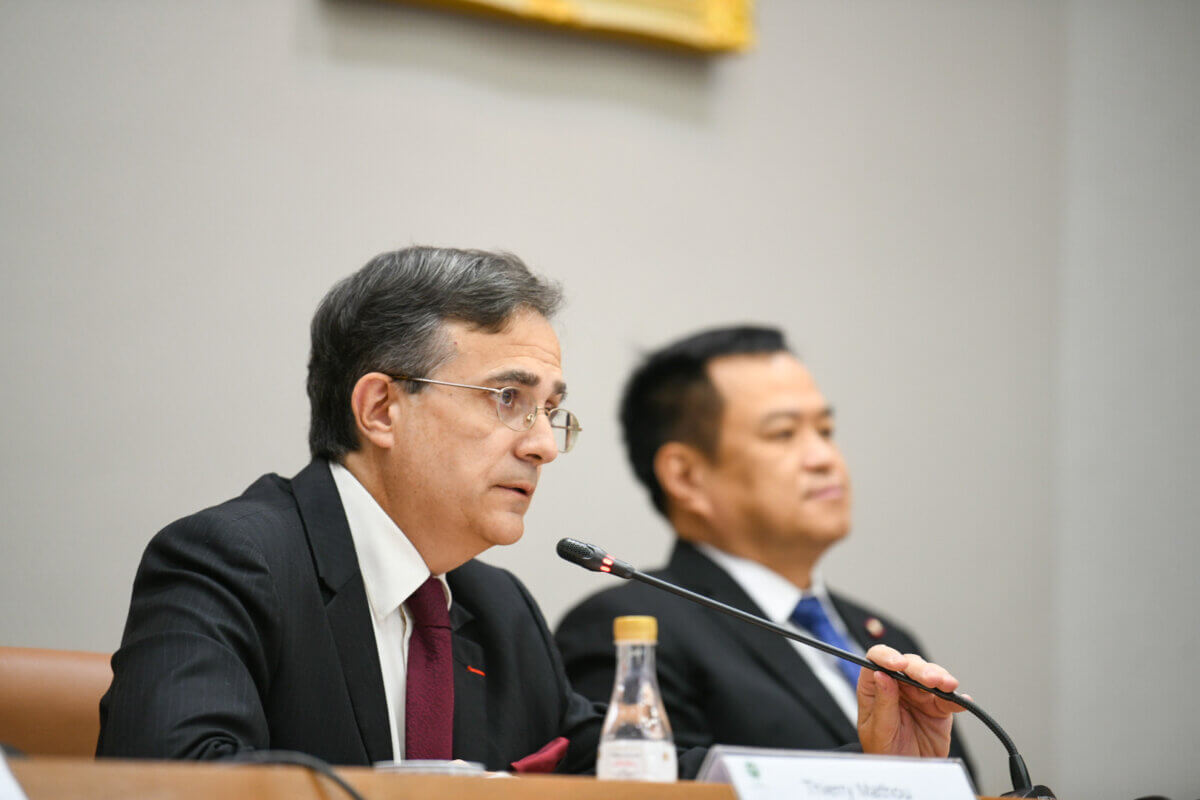
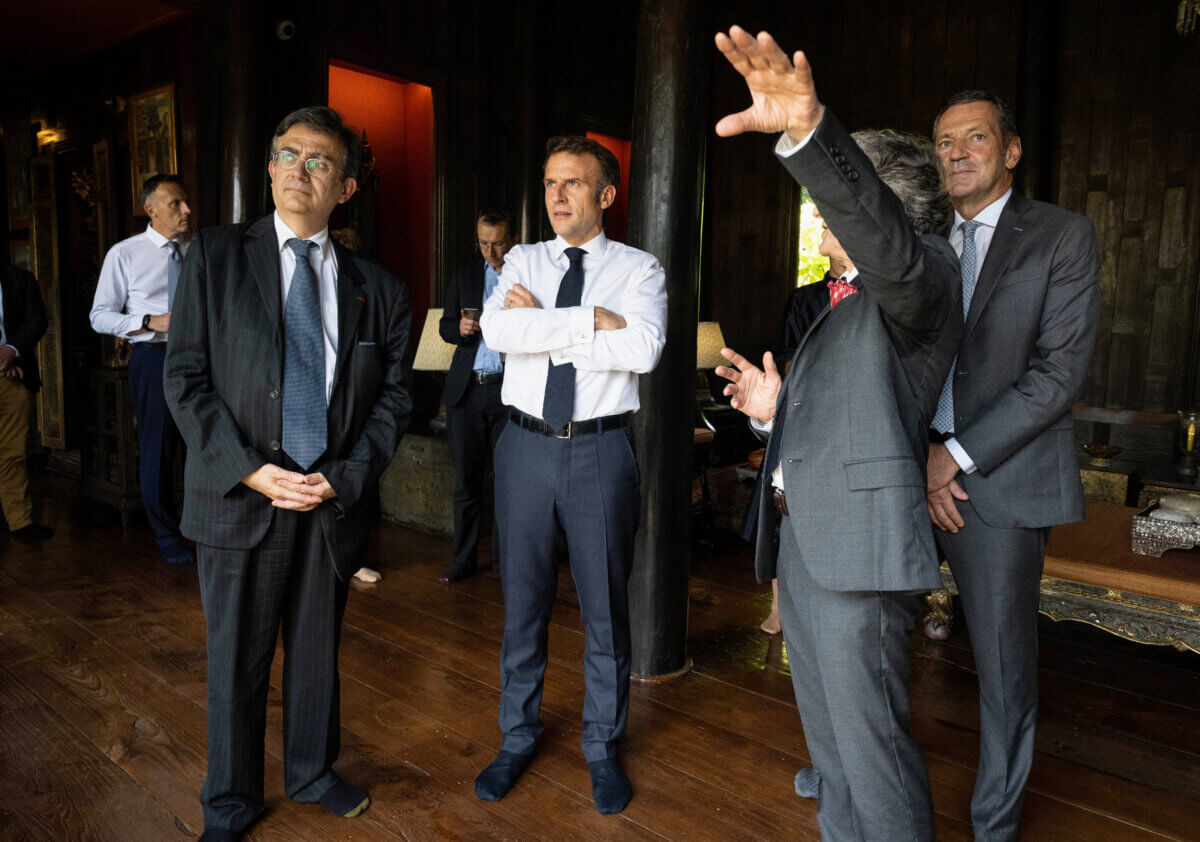
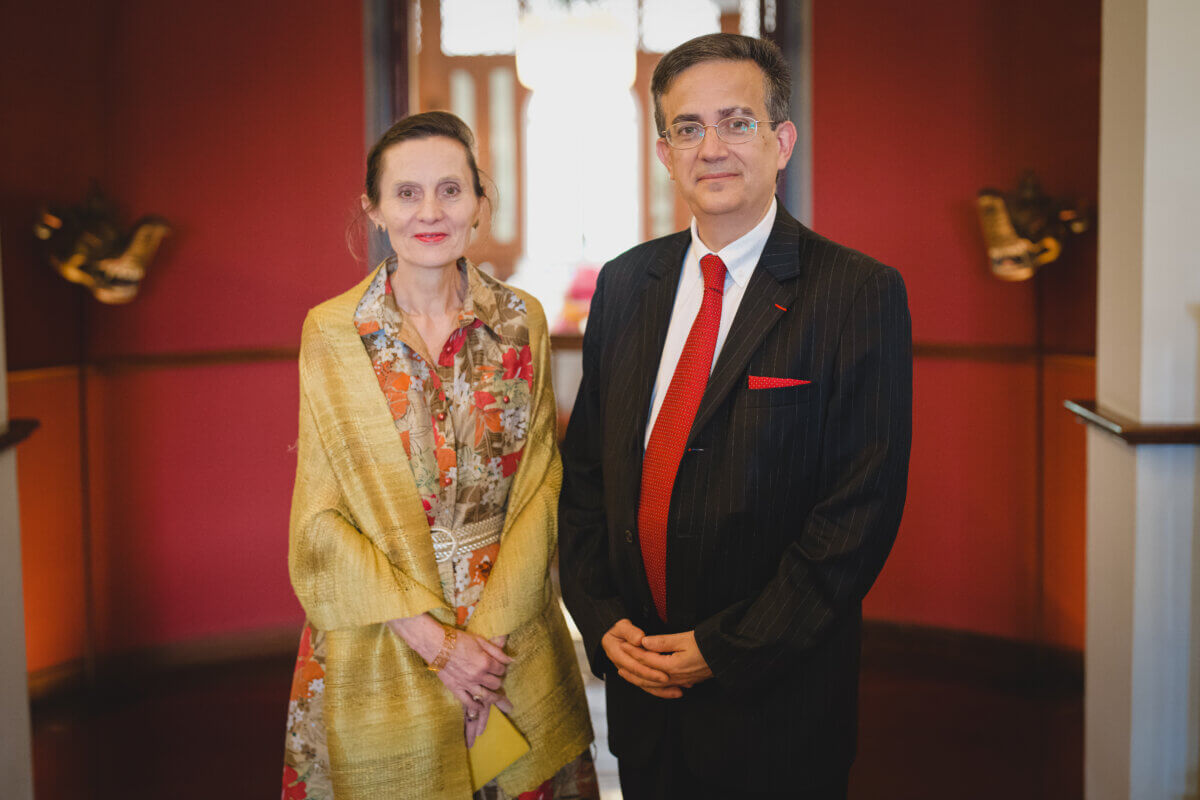
In which city were you born and brought up?
I was born in Rodez a small historical city in the South of France located in a rural area about 150km Northeast of Toulouse. Today Rodez is mainly known for its museum dedicated to its most famous citizen, Pierre Soulages, an internationally celebrated contemporary painter, who was born there in 1919 and died last year at the age of 103. I spent my childhood and my teens in Rodez province known as Aveyron, a region famous for having some of the most beautiful villages in France, but also for the spectacular Millau viaduct – the highest road bridge in the world – and for Roquefort, the French consider as “the king of cheeses”. Then I moved to Toulouse the centre of the European aerospace industry, with the headquarters of Airbus and the SPOT satellite system, and to Paris where I studied political science, international relations and Asian languages.
At which age did you decide you wanted to become a diplomat?
I always knew my career would lead me to Asia. At some point I hesitated between becoming a diplomat and a full time scholar. I chose diplomacy because I wanted to serve my country and to have a positive and active contribution to crisis solving. Yet I also became a non-professional academic because I think it is essential to keep an acute cross-cultural understanding and awareness of what’s happening beyond borders of knowledge.
Do you have any other diplomats in your family?
No. Most of my family members including my parents were teachers. My wife had a career as a banker and an international financial consultant before she decided to reorient her career to teaching then to supporting our three children family.
How do you see Thailand today, in ASEAN, and in a wider context?
I see Thailand as an increasingly important regional centre for economic development and geostrategic stability in SE Asia. In this respect, ASEAN is both a major vector of this dynamism and a platform for Thailand to express itself on the regional and international scene. Created in Bangkok more than 50 years ago, its vocation of “centrality” within the IndoPacific zone is largely carried by Thailand, which is one of the 5 founding members. But Thailand also has other means of influence and development: in addition to its geographical position, which makes it a key territory in the dialogue and interconnection of the region, it is also central in terms of investment attractiveness, tourism hub and in the life of international organisations, such as the UN, through the UNESCAP in particular, but also the UNDP, WHO, UNHCR, ICRC, UNODC, IOM FAO, and many other international and non-governmental organisations.
France is particularly involved in this dynamic of development and search for balance in the region, as underlined by the presence of the French President as the guest of the Thai Presidency of the APEC summit in November 2022, which was held in Bangkok. An initiative that had no precedent for a European head of state, but which reflects the long standing French presence in the IndoPacific region and the friendship between our two countries. Thailand is also a hot spot in the region to develop cooperation to fight climate change and the loss of biodiversity and develop awareness in the field of global health.
Do you see any similarities between your country and Thailand?
As you know, Thailand is historically France’s oldest partner in Asia. In 2016, the two countries celebrated the 160th anniversary of their relations (the Treaty of Friendship and Commerce between Siam and France was signed on 15 August 1856). This friendship lasts because Thailand and France have a lot in common.
Our two nations are of comparable size and our two countries have an ancient history and a rich culture. We both have amazing food and beautiful natural landscapes. From all that we draw the same commitment to our independence and to our national sovereignty, as the people of France, like the people of Thailand, are fiercely attached to their traditions.
But both countries are much more than that. Both countries have a tremendous desire to reinvent themselves, and to explore and embrace the future. Our two countries have both developed a large network of world class businesses, technical experts and researchers in cutting edge fields to realise the potential of new technologies and to bring prosperity to their people. That is the reason why we launched in January with our Thai partners the Thai-French 2023 Year of Innovation, which displays over the year several events and initiatives showcasing our creativity.
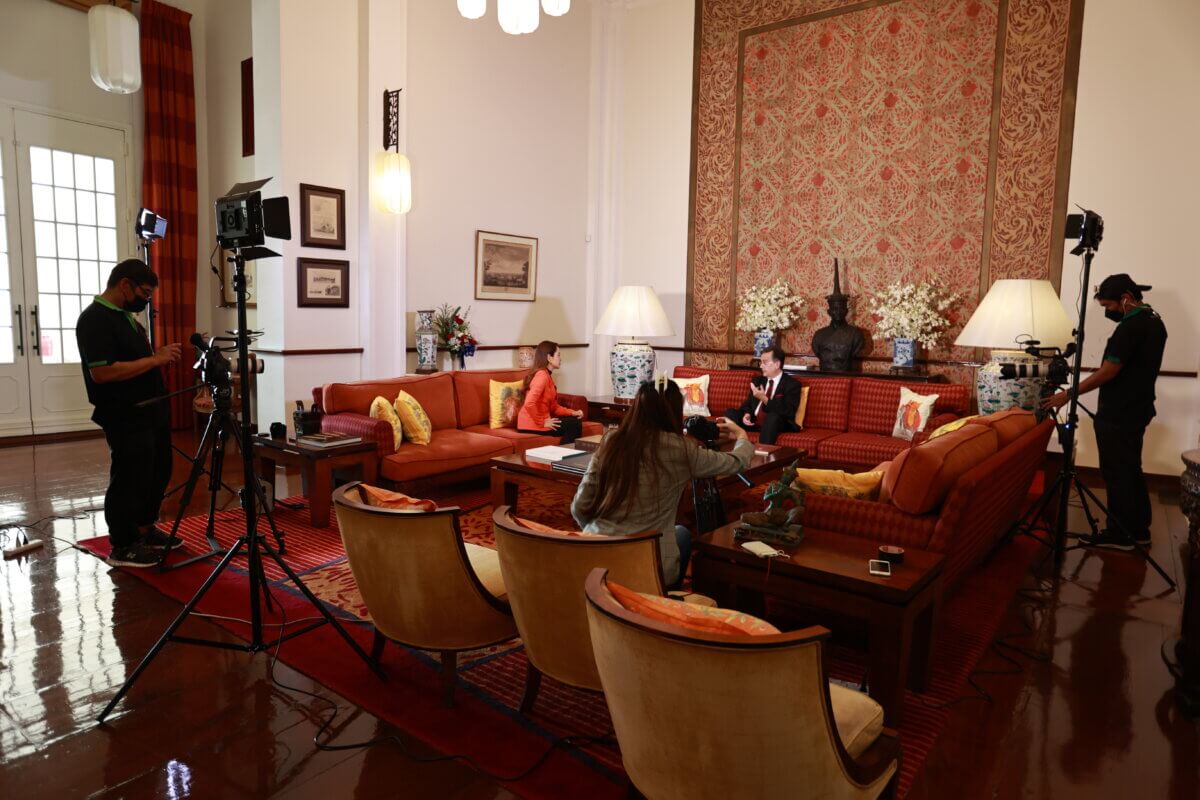
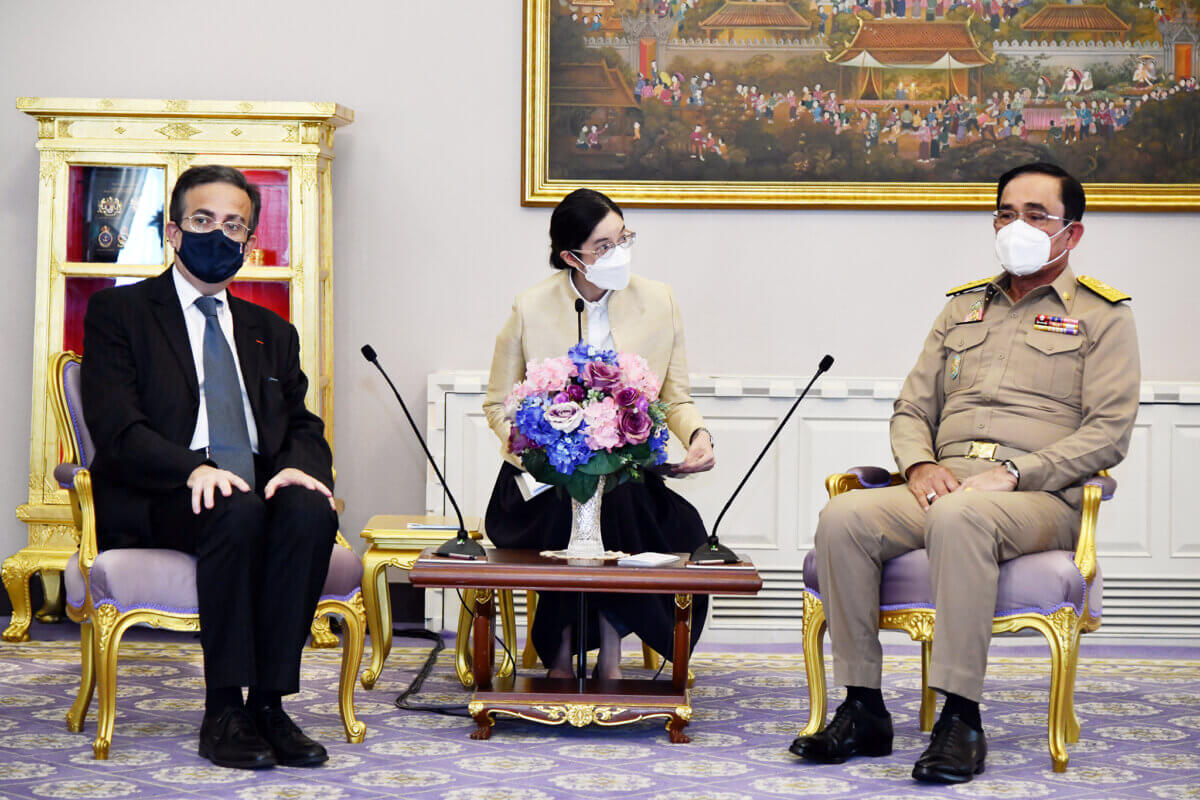
Do you have children, if so at what age and where do they go to school, university or work?
I have one daughter (30) and two boys (27 and 24). My daughter Alexandra graduated from the Institute of Political Science in Paris and Fudan University in Shanghai. After starting her career in Shanghai and Hong Kong, she is now working as a development manager in a global software company in Paris. Being perfectly fluent in Chinese she will probably return to Asia for her career. My eldest son François graduated from the French “Ecole Normale Superieure” in Paris and from Cambridge University. He is an historian who got the academic rank of “agrégé” a University French title who entitles him to be appointment to the highest teaching post in the university system. For the time being he is completing a PhD in History. Charles, my youngest son is an airspace engineer who graduated from ISAE-SUPAERO Aerospace Engineering Institute in Toulouse and from “Ecole Polytechnique” in Paris. He is completing a PhD in Information and Communication Science and Technology (ICST) with ONERA the French Defence, Aeronautics and Space Research Agency. He is planning to join the European Space Agency (ESA).
How do you look upon your work here? How does an average day look like?
Extremely busy since Covid-19 started to fade away. Yet the best moments of my career have always been those I could spend in the field outside my office, meeting people and implementing projects in a concrete way. This is something that I have done a lot during my previous posts and have been striving to do here since there are no more constraints to travel. Visiting local projects in Bangkok and going to the provinces to reach out to “real” people is what I enjoy the most.
Have you set some goals you really would like to fulfil before you leave Thailand?
I think we did achieve a lot of goals that I set up for my mandate before I arrived.
First, we managed to have the bilateral roadmap signed last year. This roadmap commits both countries from 2022 to 2024 to promote concrete projects in four major sectors: security and defence, economy, human exchanges, global issues. In this roadmap, there are a lot of objectives set to reinforce the relationship between France and Thailand with the goal to upgrade our historic bilateral relation to a strategic partnership in 2024.
Second, there was also, as you know, another historical achievement. Last November, the Government of Thailand took the initiative of inviting the French President, Emmanuel Macron, as Guest of the Chair to the APEC summit. It was indeed the first time since the creation of APEC in 1989 that a European head of state or government had been invited to the APEC Summit!
President Macron had a very constructive talk with the Prime Minister, and he was granted a special audience by the King, which as you know is fairly unusual. This visit (the first visit to Thailand by a French President since 2006) showcased that there is a strong will on our side, to enhance the relationship with Thailand.
Last and not least, in January, we launched the “Year of Innovation France-Thailand 2023”, which aims to promote the cooperation between Thailand and France in high quality sectors such as aeronautics, health, environment and culture industries. Throughout this year, all the events of the “Thailand –France Year of Innovation 2023” will help connect researchers, companies, start-ups and hi-tech businesses. This initiative will have very practical implications, such as strengthening the collaboration between the landscape of French and Thai priority sectors such as space, environment, health, cultural and creative industries. The objective is to create a joint platform of Innovation to identify and support innovative projects of cooperation.
Thailand is a key partner for France in ASEAN. Up until now, a lot has been done, but we still have a lot to achieve to bring the bilateral relation between France and Thailand where it should and where it needs to be.
Have you managed to travel in Thailand yet?
I am the Ambassador of France to Thailand, not to Bangkok exclusively! I take immense pride in travelling as much as I can, whether it is to go meet the French community in Samui, Phuket, Pattaya, Hua Hin, Chiang Mai, Chiang Rai, Udon Thani or Khon Kaen as French residents are scattered all around the country, or whether it is to visit universities, institutions, or environmental initiatives on my official duties.
I have been visiting many place from the far North to the deep South, from the border areas with Myanmar, Laos or Cambodia to several of Thailand’s beautiful islands. I do travel a lot around the country. And I think that you only know Thailand if you get to go everywhere. Not only the cities. Go in the most remote places, the smallest villages in Isan, Tak or in the North, or on small islands.
In those places you can enjoythe diversity of landscapes in this country and understand the Thai spirit. From mountains, to rice fields, to deep jungles or beautiful beaches, Thailand has almost everything. And Thais are one of the most welcoming people on the planet.
When you have a day off, what do you prefer to do? Any hobbies or pastimes?
Besides my diplomatic career I am also, as already mentioned, a scholar who specialised in Himalayan studies. So most of my spare time (mainly at night!), I read, or I write. I dedicate my free time to writing books and articles, mainly on Bhutan. One of my last book was about the Bhutanese concept of Gross National Happiness which has a lot to do with Buddhism. In Bhutan, Buddhism is more than a religion, it is a philosophy of life and an inspiration for policies, which offers a holistic vision of society, culture and economy, which takes on a very particular character in Bhutan where the concept of Gross National Happiness has been coined. In this context, the way that Bhutan reconciles tradition and modernity is fascinating even if the country is currently facing many new challenges.
I am currently working on a new book, at night, still. It will be about the saga of a famous family from Bhutan who had an important role in the history of the country and of the Eastern Himalayas. It’s a fascinating story.
How many of your countryfolk are living in Thailand? When and why did Thailand become a desirable destination for your people?
Thailand hosts the largest resident French community in Asia – more than 14,500 officially registered at the embassy. But as the registration is not mandatory, there are in fact a lot more French nationals. According to the Thai immigration services, there are around 45,000 French residing in Thailand. 30% of them are senior citizens living off their savings, enjoying their well deserved retirement, in every part of the country, from Hua Hin to Phuket or Chiang Mai, and even in Isan.
But the French community also comprises more and more young professionals, working in French or Thai companies. There are also countless French business owners, entrepreneurs who invested in Thailand and started a small business here, and some of them became big, or even became a multinational corporation, like the Dextra Group, and managed to create wealth in the Kingdom. There are a lot of them, they actively participate in the country’s prosperity, and also for the place of France in Thailand, as they, too, bring a little bit of “French spirit” in the country.
Does your country and Thailand have an exchange programme for students?
Indeed we do. There are several intellectual and cultural exchanges programmes between Thailand and France. More than 600 hundred Thai students go to France to study every year and approximately 110 French students come to Thailand every year. (They always have a hard time to go back to France afterwards, if I may say, because they like it so much here). You could consider that 600 is not many, but we select the best! France values and welcomes these incredible brilliant Thai students. As a result we offer many scholarship programmes for Masters and Doctoral students to come study in France. We also have a programme named “Young Researchers” which brings innovative and promising young Thai researchers to France, where they can train and continue their research in the most advanced French laboratories.
We also have students in the social science field, as France developed several specific scholarships, in cooperation with the Thai government, to help train Thai magistrates. In the last few years, that amounts to hundreds of students studying and living in France. That is the priority of our cooperation in terms of budget, as it represents 65% of our exchange budget. But what is important is that this is not random. We always try to establish sustainably research partnerships. To work with a long term vision, primarily through bilateral Franco – Thai co-financing of the projects. If both parties are financing, then everybody wants to succeed, and gain something from it. Our numerous common research programmes are in the fields in which both our countries are interested (chemistry, biology, health, agronomy, health, engineering sciences, etc.). That is why also, France has decided to establish in Thailand most of its main French research organisations (CIRAD, IRD, IRASEC, etc.).
Some of these research institutes are even settled within the amazing campuses of your universities in Thailand. Their regional networks are working hard to promote the excellence of French research in Thailand, in areas that are paramount for Thailand: air pollution, plastic pollution, climate change and, the last one is very important as we have seen in the Covid-19 crisis, the nexus “biodiversity, human health and climate change”.
The Asia-Pacific Association of International Education (APAIE) recently organised its show at Queen Sirikit National Convention Centre in Bangkok. A huge delegation of French universities led by “Campus France”, the French Government Agency dealing with foreigners students in France was present. It was clearly the sign of our intention to dramatically increase the number of Thai students in France.
Also, of course, the embassy is trying to strengthen the attractiveness of the French language in Thailand. For now, about 500,000 Thai people are speaking French in the Kingdom, and more the 30.000 young Thai students are studying our language at the secondary or university level. But we want more. We are emphasising three priorities: support for the education system, renewal of the pool of learners and the development of French education. Our teams are helping the network of Thai teachers of French language, by engaging with them in a permanent linguistic training for Thai teachers. They are doing an incredible job in advocating Thai students to learn French and showing them, the benefits of it in their future. Like going to study in France for instance!
Our cultural and linguistic institute, the “Alliance Française” is also very active in promoting French culture and language. “Alliance Française”, is located next to One Bangkok is very well known in Krung Thep Maha Nakhon. It is also present in Chiang Mai, Chiang Rai and Phuket. We also have 5 French schools in Thailand where Thai children are most welcome. In Bangkok for instance 50% of the students of the French International School (Lycée Français International de Bangkok – LFIB) have Thai citizenship. We are even planning to create a French school in Chiang Mai.
Any fun moment from Thailand that you’d like to tell us about?
Not really a fun moment but a funny anecdote I often like to mention as it tells something about the way France is involved in the everyday life of the Thai people in a most unexpected way. Two years ago I visited an experimental farm created near Khon Kaen by HM. Clause a worldwide French company specialising in the selection, production, and sales of vegetable seeds, part of the Limagrain Group, N°1 worldwide in vegetable seeds. The ambition of this company is to contribute sustainably to the development of farmer’s activities by improving disease resistance, yield, ease of harvest, shelf life. They also work to maintain local biodiversity, by selecting seeds adapted to the local growing constraints. In doing so they are committed in Thailand to providing local farming communities with the best vegetable seeds that will increase their income and improve the living of their community.
As an example, they developed a new hot pepper variety, dedicated to the Thai market and taste. They called it the “Super Thunder”. It became so popular that about 30% of the chilies grown in this country come from their seeds. So I like to extrapolate by saying that 30% of the chillies you eat in this country are French chillies even if I often say “Mai Phet” but never “Mai Sai Prick” when I am in a restaurant. I like chillies but not too much of them!
Gastronomy is an essential component of French and Thai culture. While hot pepper is important in Thai cuisine, it is not really the case in France except in some Southern provinces. Yet it is funny to realise that it is now one of our contribution to Thai gastronomy! I once mentioned this to H.R.H. Princess Sirindhorn who was surprised and told me that she was curious to visit this farm which is also a cooperative and a research centre.
Do you regularly meet up with your community?
I regularly meet with the French community each time I travel to the provinces and also when there is an official visit, as it was the case when President Macron came to Bangkok. It was the occasion to organise a big event with representatives from the French community, business leaders, associations, celebrities, and also normal people living here, from retirees to digital nomads. We try to have an open and inclusive embassy, and most of all we are trying to engage and talk to the whole community to better understand their needs. And this year for the first time after the Covid-19 pandemic, we will be hosting a big event for our National Day, Bastille Day, on the 14th of July for French and Thai people to attend.
It is time to celebrate all together the return to an almost normal post-Covid-19 life, even if pollution remind us that mask can still be useful!
(Visited 838 times, 1 visits today)


